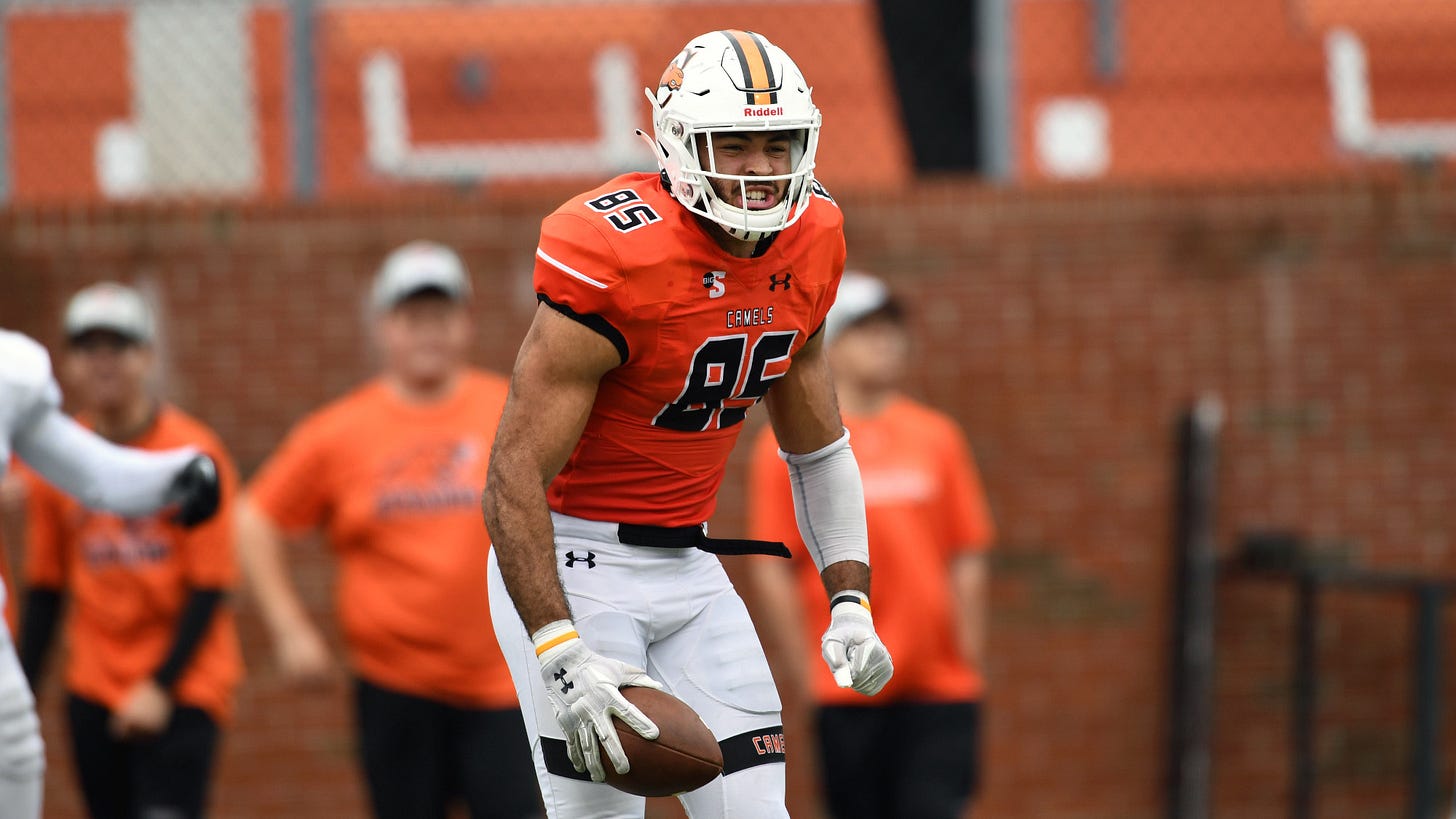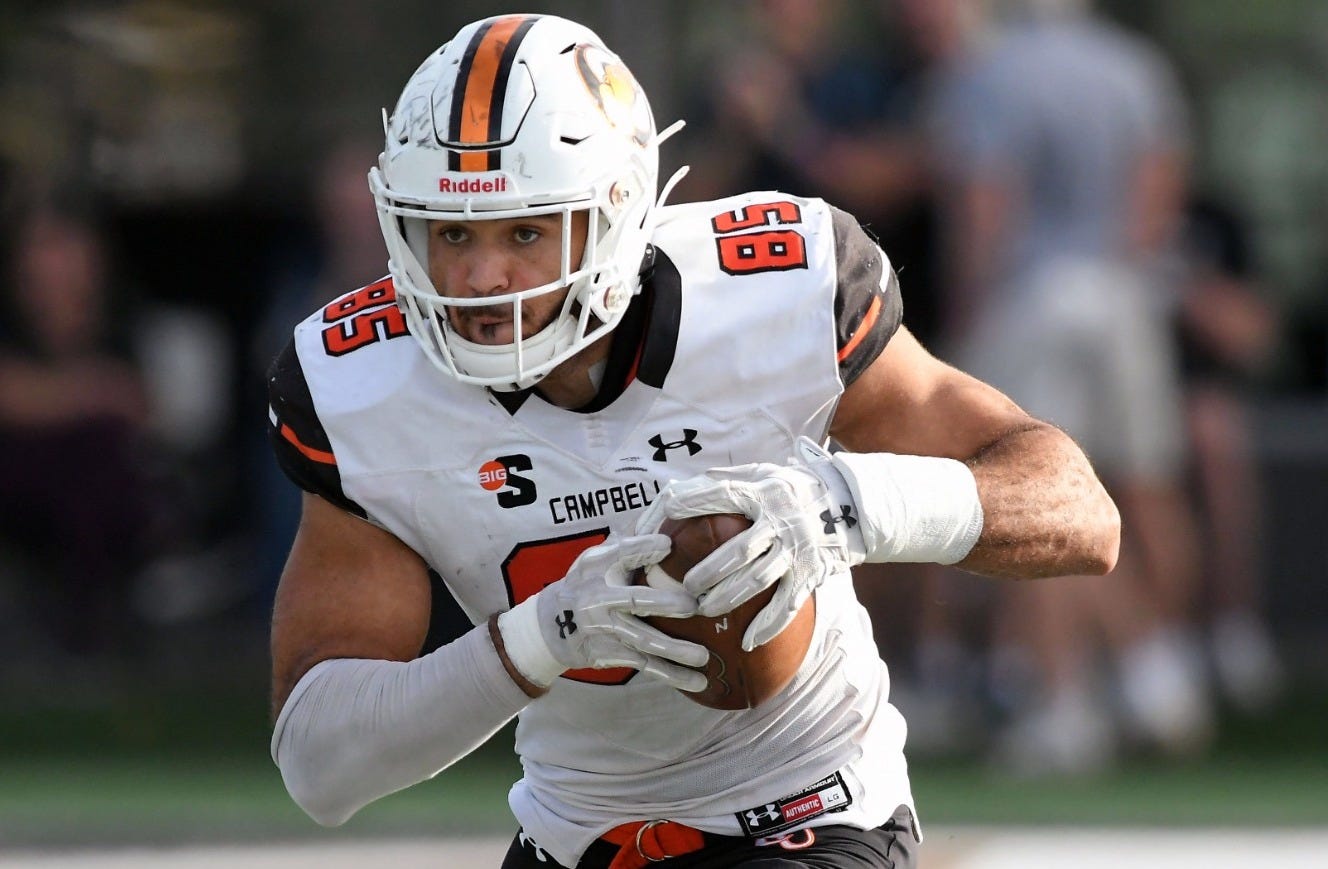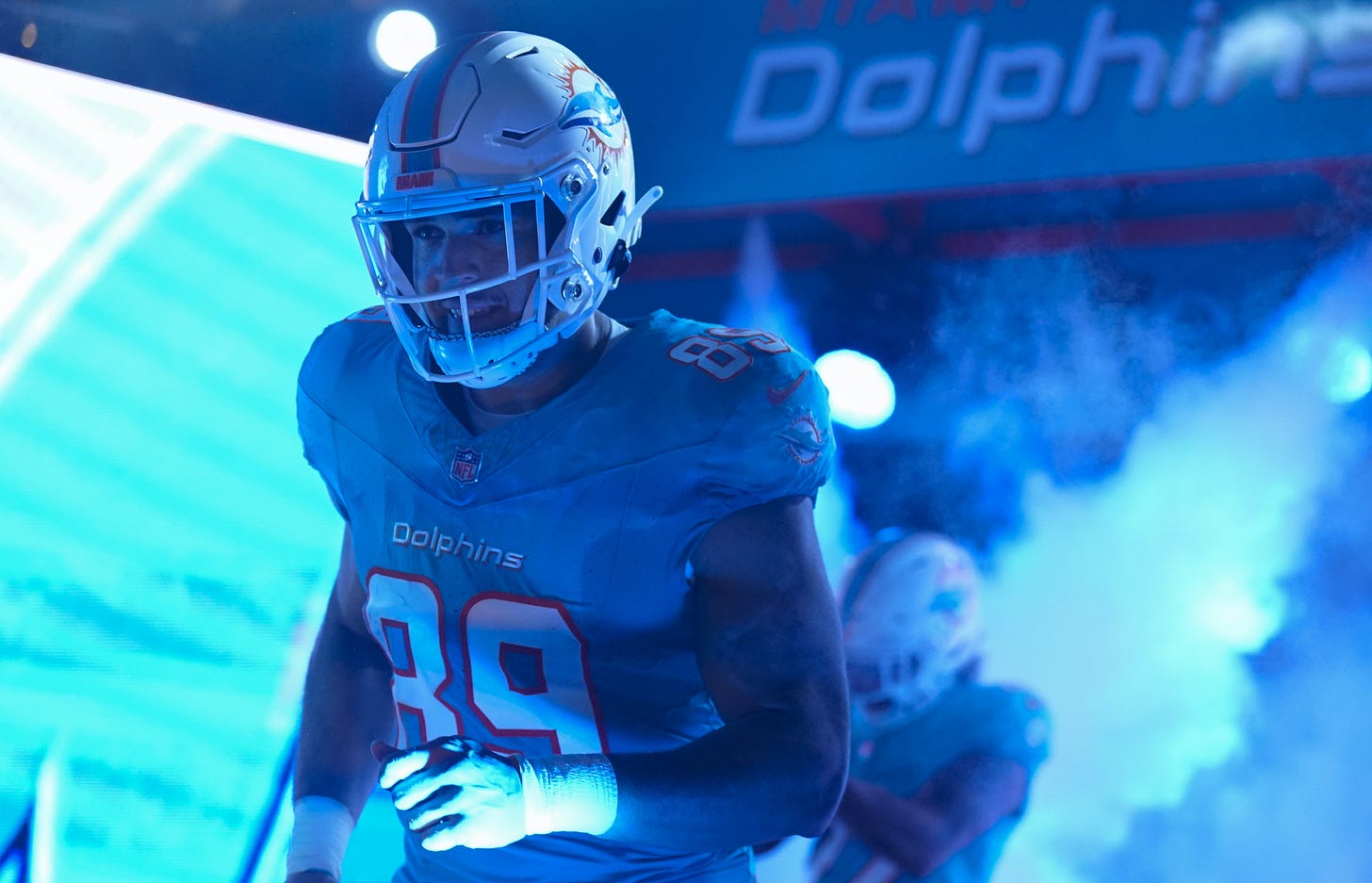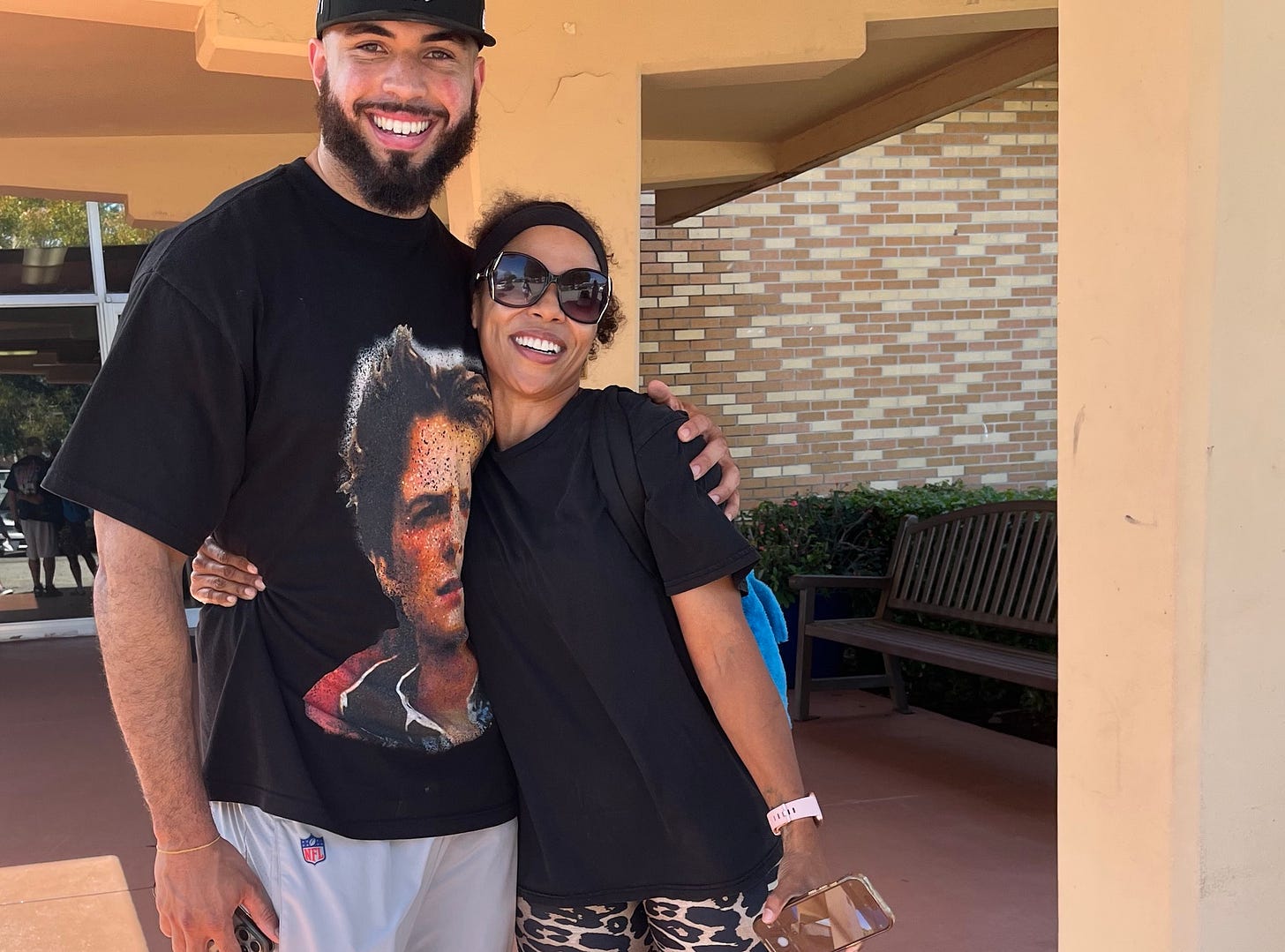Julian Hill will save lives, Part III: Destiny
He started to lose himself last season. Then, the Miami Dolphins tight end met kids at His House Children's Home and the 24-year-old realized how he can change the world. Our series concludes.
Miss Part I? Read here.
Miss Part II? Read here.
MIAMI GARDENS, Fla. — The one college recruiter who did not abandon ship walked into the basketball gym with extremely low expectations. Damien Adams knows how long it takes 15- and 16-year-olds to mentally recover from one torn ACL, let alone two. Let alone in back-to-back seasons on the same knee. No doubt, Julian Hill would tip-toe around contact.
Adams, an assistant coach at Campbell University 25 miles north, fully expected to see a young man ever… so… gently easing his way back into physicality.
By this point, everyone else bailed. Colleges wanted nothing to do with the kid who survived a traumatic childhood, who completely turned his life around. In thunderous unison, the football, basketball and baseball coaches at Pine Forest (N.C.) insisted Adams give Hill a shot. So, he did. Nor did Adams tell a soul that he was coming. He wanted his attendance at this Pine Forest basketball game to be a secret.
Adams walked into the gym devoid of any Fighting Camels paraphernalia, didn’t speak to anyone and it took all of one quarter for him to realize that Hill was not like most kids.
A bulky brace over his knee, Hill rampaged up and down the 84-foot court with the unhinged fury of a bull seeing nothing but red. He corralled rebounds. He dove horizontal for loose balls. Shy from contact? He relished it. Adams’ favorite play was actually a basket interference infraction that rewarded the other team two points — Hill was running so hot that he inexplicably slapped the backboard. Clearly, Hill was not worried about his knee. At all. He brought a different level of intensity to the entire game.
Technically, Adams was the defensive line coach at Campbell, but it didn’t matter. He wasn’t trying to project Hill at a specific position that night. How anyone walking this earth plays basketball tells you so much about that person, and Adams was sold.
All he knew was that Campbell University absolutely needed Hill in the building.
“He’s all over the court,” Adams says. “He’s being ultra-aggressive on the court in terms of his movements and his overall attitude. It was a pleasure to see. … I know that he’s a guy in terms of his mindset. He’s very infectious with his personality. Very intense. A leader amongst men.
“We need him in the building, period.”
Adams “stood on the table” for Hill and Campbell’s head coach — former NFL safety Mike Minter — agreed to give Hill a shot as a walk-on at the FCS school.
Hill was thrilled. But when he arrived, coaches instructed him that he’d be a tight end.
Which, uh, was not what he expected. All offseason, Hill had trained to play quarterback. His auto-tech father even hunted down a local quarterbacks coach to work with his son. (Not easy in Fayetteville, N.C.) Hill hadn’t put his hand in the dirt since he first picked up a football. Minter might as well have asked him to pick up hockey. “I couldn’t catch. I couldn’t block, I couldn’t do anything,” Hill says. Frustration mounted. He’d call Mom every night in disappointment.
“But one thing I did have,” he adds, “was heart.”
That’s all Julian Hill has ever needed.
One school believed, so his dream was alive. No chance in hell he’d waste it.
Go Long strives to bring you pro football in its realest, rawest form.
We are completely independent and powered by you.
Hill scoured YouTube for tutorials on “how to block” and “how to catch.”
Hill ran gassers. Nonstop. In full pads — after a three-hour practice — he’d sprint the 53.3-yard width of the field 10 times. Then, it was time to run routes. The most common sight at Campbell was this towering freshman catching passes from a friend deployed as his designated quarterback — “every single day,” Adams adds emphatically. One night, the sun had already set. No lights were on. Hill worked out long after Campbell’s practice, film and meetings concluded. The kid who’d hoist 500 free throws in his driveway back home refused to go to sleep.
“I walk over to the fence,” Adams recalls, “and I say, ‘Julian, it’s time to go home. You can’t burn the candle on both ends, buddy!’”
Hill didn’t hesitate. He informed Adams that he’s not only playing for himself.
“It’s a wanting feeling,” Hill says. “If you’re just doing it for yourself, man, you can have a prosperous career. You can have a phenomenal life. But that feeling of helping, that feeling of serving, that’s my purpose in life: to serve. So everything I do is for that. That’s when that fire started to get cranked up. So I was like, ‘Coach, you don’t get it, man. I got people counting on me.’”
It took all one semester for Campbell to give Hill a scholarship. (“That almost never happens,” Adams adds.)
There was nothing magical about his growth. Hill believed that giving anything less would’ve been a disservice to everyone who poured into him. When Hill learned that nobody from Campbell had ever cracked a 53-man NFL roster, he was stunned. One alum, Greg Millhouse, spent a preseason with the New York Giants in 2016 and his picture was hoisted up on a wall at the Fighting Camels’ facility. The odds of carving out an NFL career at this Big South school in Buies Creek, N.C. were somewhere between getting struck by lightning and winning the lottery.
Says Hill: “I realized if I want to do what somebody’s never done, I’ve got to do things that nobody ever did.”
He learned to block, to catch and — when he suffered back-to-back broken collarbones — Hill did not fret. Neither fracture triggered a day of anxiety. He assured the Schaeffers and Erwin Montgomery Sr. back home that he’d be perfectly fine because Hill knew he was making sacrifices peers would never consider. Good luck finding Hill on social media — he has exactly zero accounts on Twitter, Instagram, TikTok, etc. Back in high school, Dad offered sage advice: “Who cares? Fuck everybody. Don’t worry about anybody but you and your immediate family.” All hours that could’ve been wasted scrolling were instead put to good use.
He monitored his diet, always made sure to get a full night’s sleep and pushed himself through those extra gassers — all at the expense of the quintessential college experience.
Hill never partied, never drank, never… did a lot of things. Adams describes Hill’s drive as more of an “insatiable desire” to be great and assures Hill was “vigilant” when it came to eliminating the social aspect of college.
Such as?
“He abstained from the females,” the coach says. “He gave that up. He did not want any distractions at all.”
Discipline that eventually paid off tenfold.
The kid who couldn’t catch a cold if you were deathly sick and sneezed into his face soon went an entire spring without dropping one ball. Campbell kept on bringing in other tight ends to take his spot but Hill was never concerned. “Nothing against them,” Hill says. “I’m chasing something. There’s something in me. It’s bigger than me.” Five full years of work and sacrifice led to a breakout senior campaign. In 2022, Hill caught 38 passes for 659 yards with five touchdowns, all while consistently driving linebackers and defensive backs into the turf as a blocker. That season, Campbell’s starting quarterback went down and the backup needed a security blanket.
The capstone was his 122-yard game in a 43-37 loss to Bryant in which Hill cradled a deep over-the-shoulder touchdown.
Another hint is inscribed on his wristband this day in South Florida: Philippians 4:13, I can do all things through Christ who strengthens me. Hill laughs that he is the one you’ll see jumping up and down in the first row of church. College is when his faith grew exponentially. The student who got him deeper into religion at Campbell is actually hanging out with us this day.
Hill realized that a sport could help him give back to those loved ones. Football could help him sincerely “serve.”
“That’s my purpose,” Hill adds. “That’s why I’m here. I’ve got to work, work, work, work, work. There’s so many people counting on me.”
Fearlessness was central to his game. The brawler that Adams loved on that Pine Forest basketball court attacked every task at one speed. “To transition from being a quarterback into a blocking tight end,” Adams adds, “speaks to him having the type of attitude that you want to have to impose your will on people.” These days, Adams is the defensive tackles coach at Sam Houston State. Through all of his years coaching, he’s never encountered a player at any position wired quite like Hill.
Now, all Hill needed was one NFL scout to take the same chance Adams did.
The life of a scout can become monotonous. An endless cycle of film… and interviews… and lonely Marriott nights. But visits to Campbell University were always different. When scouts sat down to chat with Hill, a funny thing happened: Hill started asking scouts endless questions. All while taking pages upon pages of notes.
“Every single one of them,” Adams says, “would leave the meeting with their jaws dropped.”
Next, at the Hula Bowl, Hill proved he can hang with prospects from the larger schools and continued to chat with NFL scouts and coaches as if he’s been in the NFL for a decade.
“There’s no 21, 22-year-old kid that would sacrifice the things that he sacrificed,” Adams says. “Most guys are happy with being on the team, catching a few balls in the season, and they’re a captain of the team. So they get all the things that come with that — the marketing of the football program, the girls. He didn’t care about any of that stuff. That wasn’t a part of his thought process.
“He has obviously gone through things that have been tough and shined through all of it. So he’s a level above someone that doesn’t bring those same characteristics to the table. Even if they may have more ability than he does, they’re not going to shine as bright because of the intangibles he’s bringing.”
That spring, the Miami Dolphins signed Hill as an undrafted free agent and everyone back at Pine Forest and Campbell alike knew a spot on the 90-man roster was all he needed. He was making the 53. He’d out-work everybody. Now, he’s entering Year No. 3 in the NFL and Julian Hill is the bruiser the Dolphins need to once ‘n for all trade punches with the AFC’s elites. It’s been a struggle. As Tua Tagovailoa, Tyreek Hill, Jaylen Waddle and De’Von Achane supply the fireworks, someone must do the dirty work in 2025. For too long, Miami has been shoved around when the going gets tough.
Last season, the tight end played 48 percent of the snaps on offense and 55 percent on special teams.
As Hill’s football career miraculously blossoms from the dreary depths of those crowded trailers, one person has been noticeably absent: his biological mother. After initially describing their relationship as “cordial,” he admits they do not speak. There was a major falling out between his biological mother and adopted mother. Today, Hill doesn’t even know where his blood mother’s living but he heard that she’s been clean for 5+ years and maintains there’s no ill will. Rather, he’s grateful she fought as hard as she did through those homeless years.
“She’s a soldier, she hustled,” he says. “Without her doing all those things? I wouldn’t be here today.”
When the time’s right, he’ll reach out. Not yet.
After all, Julian Hill has lives to save.
The NFL is a cutthroat profession quite proficient in draining its participants of all joy. You’re a commodity, a cog, a robot and as the cruel nature of the sport becomes clear, your why gets fuzzy.
Very quickly, young players forget why they fell in love with football in the first place.
As a rookie, in 2023, Hill’s head was spinning too fast to stress out about anything. His brain was only focused on the task immediately in front of him. But last season? The Dolphins needed Hill. Mike McDaniel called running plays his direction and No. 89 became a lightning rod for a large contingent of the fan base. Pressure mounted and he didn’t handle it well. He’s the self-proclaimed “type of cat” who tosses his gloves into the stands to fans after games. A small act of kindness that annoyed the equipment staff.
In ways big and small, he felt the full force of the NFL’s inevitable culture shock.
We’re standing outside of the main entrance at His House Children’s Home in South Florida now. Hill opens up.
“Can I be honest with you?” be begins. “People don’t care who you are. They care what you do. You can lose purpose in that. You can lose your sense of purpose in this game.”
A close relationship with McDaniel helps. The Dolphins head coach knows all about Hill’s surreal roots.
But he felt a void within. Something was missing. In search of “a place to serve” to recapture that same intoxicating adrenaline rush that fueled him from Fayetteville to Campbell, he wound up here at His House. It was a Christmas party. Less than three miles from the Dolphins facilities, Hill arrived with his No. 89 jersey on. And exactly as millions of athletes have since the dawn of professional athletics, Hill shared pieces of his traumatic childhood with kids who’ve experienced their own hardships. The TedTalk-like address generally follows the same theme: Dream big and you, too, can achieve anything you want.
But when Hill looked into their eyes, half of the kids weren’t paying attention and half didn’t give a damn what he was saying.
A light bulb went off.
“They don’t care where I’m from,” Hill says. “They only care about how you make them feel.”
He remembered what it was like to be in their shoes. Before the Schaeffers saved him, chaos was his norm. Cockroaches and bullets and fists and mayhem. Before arriving at His House, chaos was their norm. The reason so many kids looked disinterested was those kids assumed this was the last time they’d ever see Hill. Too often, an athlete, a celebrity, any adult with a powerful message shares a story for 30 to 40 minutes and leaves. Never to be seen again. He put himself in their minds: “Why are we even going to interact? You’re just here to visit. You’re just here to talk.”
Hill realized that these kids — many who’ve been trafficked — need so much more than one speech to heal.
So, he returned.
The next visit, Hill made a concerted effort to befriend kids on a 1-on-1 basis. When one boy dropped a pass and Hill heard him mutter under his breath, “I suck,” he lifted him back up. He could tell the boy all about his first year in college when he couldn’t catch anything. When one young girl was visibly hurting because she missed her brother, Hill explained that he hasn’t seen his biological brother in years. All of which is precisely what His House director David Castrillon insists these 200+ kids need most.
Only true relationships can cultivate the “true love” these children have never experienced.
Rescued from the darkest dredges of society, they’re at the fragile juncture of their lives.
Hill wants to be a source of salvation. As his NFL career progresses — as more people nationwide learn his name — he vows to bring kids with him. He’s now consumed with the same urge that compelled the Schaeffers to save his life. He wasn’t trafficked. He didn’t live in a group home. But Hill can directly relate to their emotions.
Back to college, Adams recalls Hill doing as much as he could in the community.
“This is a life mission for him,” the coach says. “Him wanting to change society and pour into kids that are coming from impoverished or underprivileged or abusive or just adverse situations is no surprise to me. That is who he is. That’s who he was. He’d say, ‘I got it out of the mud.’ So that isn’t a surprise to me that he’s found something to support.”
Building trust with kids who’ve experienced what these boys and girls have since birth is not easy. On one visit, Hill brought a friend from his church. When she introduced herself to one of the boys at His House — heartfelt as possible — the boy took a step backward, scowled and said she could call him “P” for now. This all takes time, takes work, takes a level of effort many of their fathers refused to put in.
Up close, Castrillon sees that Hill is that “hope of light” these kids were missing.
Now? That tall stranger in the No. 89 jersey has personalized handshakes for many of these kids.
Hill gazes out at the sprawling fields adjacent to the 16 homes at His House and says he wants to bring them more playgrounds. He also told the Dolphins that he wants to start a flag football program because he couldn’t believe how talented the girls were when they threw the football around. Soon, Hill will create his own foundation. And he wants businesses throughout the Miami area to know that a simple donation for these kids to go out for dinner — hearing that waiter ask “How can I help you?” — plants a seed of hope.
Evil forces will never stop. There’s no way to completely solve this problem. Hill admits there are tens of thousands of kids nationwide in need of a savior.
But he’ll do his part. He has a platform and he intends to use it.
Look closely and you’ll see signs of hope.
Back in Fayetteville, the crime rate declined in 2024 thanks to a sharper focus on domestic violence. Maybe he doesn’t speak to his biological mother, but he’s happy she’s sober. Hill even heard she’s been making up for lost time with other family members.
When Hill returned home this offseason, he told his old high school coach over dinner that it’s his goal to become the best blocking tight end in the NFL. (“How many people want that as a goal?” Bill Sochovka says.) At Pine Forest, he handed out backpacks and school materials to kids. Nobody asked him to do it. The whole thing was his idea. He brought a Dolphins jersey to hang up, too. And when the school planned to place it in one location, Hill asked Sochovka if it could be moved into the main lobby to motivate as many students as possible.
At His House, Hill seeks those valuable day-to-day connections. As our conversation finishes up outside, a young woman with a sparkling personality appears. She’s a regular here and today she’s teaching a Pilates class for kids. When Hill points out that this saint at His House does a lot more than teach yoga, she brings up her latest effort.
“We’re $800 away from reaching $30,000 to build them a gym here,” she says.
“You’re how much away?” says Hill. “Eight hundred dollars? To build them a gym?”
“Do you want to see what it looks like? Let me show you what this looks like.”
She starts tapping keys on her phone to show pictures, but Hill doesn’t even need to look. His mind’s made up.
“Who do I send the $800 to?”
“Oh, wait. What?!” says the woman, in shock.
He confirms he’s serious and, voila, these kids have a new gym. The woman is in shock. “That is amazing!” she says, celebrating. “Thank you so much! Let’s go!”
They look at more renderings of the gym and kids start piling in for Pilates. As he daps them up, there’s a good chance Hill sees himself in their eyes. Sees the kid from Fayetteville, N.C., who had zero clue what the future held. This is exactly where he’s supposed to be in life. “You’re about to do some Pilates!” Hill says. “Some stretching!” They smile. He smiles.
His work is done for today but he’ll be back again soon.
Then, again.
And again.








Great read Tyler!
Amazing piece! Wonderful to receive Julian’s story. Thank you!